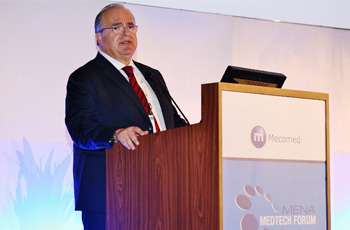 Dubai – United Arab Emirates, 24th November 2014: The first-ever MENA MedTech Forum, held in Dubai to foster dialogue on harnessing medical technology for better quality healthcare, attracted large number of professionals, regulators and technology companies from the region’s public and private sectors.
Dubai – United Arab Emirates, 24th November 2014: The first-ever MENA MedTech Forum, held in Dubai to foster dialogue on harnessing medical technology for better quality healthcare, attracted large number of professionals, regulators and technology companies from the region’s public and private sectors.
Organised by Mecomed, the premier industry association for the medical devices and diagnostic industry in MENA, the Forum succeeded in setting the tone for networking and collaboration between technology providers, regulators and clinicians to extend reliable and affordable medical care to the MENA (Middle East and North Africa) community.
The first of its kind Forum was organised in view of the increasing healthcare budgets and expanding populations across MENA, as well as the vast potential of medical technology in providing innovative solutions for better quality living.
Medical technology encompasses a wide range of healthcare products including pharmaceuticals, devices, procedures and organisational systems used to diagnose, monitor and manage medical conditions and deliver high quality medical care.
Speakers at the two-day Forum emphasised the need for the MedTech industry to work in close partnership with the public as well as private healthcare providers to offer customised, compliant and cost-effective technology solutions.
“From primary care units to huge medical complexes, there is substantial investment going into upgrading quality and developing capabilities across MENA healthcare. Strong efforts are also being made in the regulatory sphere to make sure that healthcare practices are ethical and aligned with the best in the world,” said Rami Rajab, Chairman, Mecomed.
Modelled along European MedTech Forum,, Mecomed aims to bring all healthcare stakeholders and the MedTech industry together to improve people’s health in ethical and clinically and economically sustainable ways. Currently, the group has 23 multinational companies as members.
Mr Rajab briefed the Forum on Mecomed’s strategies to build perceptions on medical technology, support authorities in regulating business practices and collaborate on critical projects beneficial to the MENA community as well as the industry.
“We are speaking of a heterogeneous market of 650 million people and US$5.2 trillion GDP, extending from Mauritania to Pakistan. Patient needs and healthcare systems across MENA are as varied as they could be, and the MedTech industry and local authorities have to work hand in hand to bring in progressive, patient-centric regulatory regimes,” added Rajab.
Internationally renowned surgeons and physicians spoke of technological advances that have enabled critical procedures like cardiovascular surgeries to be performed with a high success rate, helped develop non-invasive therapies as well as improved quality of life for chronic patients and the disabled.
The two-day Forum also featured latest updates on medical technology and opportunities for better integration of technology in MENA healthcare. This event also highlighted the importance of defining future roles, responsibilities and benefits for various healthcare stakeholders in MENA region.
“Each stakeholder group must focus on their expertise, for instance multinational manufacturers should focus on developing and bringing in cutting-edge innovative medical technology to the region, while their local partners and distributors should gear towards becoming experts in logistics and customer service. This will help the industry to consolidate and grow further,” added Rajab.
“MENA countries are estimated to witness a four per cent GDP growth and seven per cent increase in per capita health spend during the next eight years, while such growth would be two per cent and 3.3 per cent respectively in the developed world,” remarked Imraan Munshi, Partner, McKinsey & Co.
Economic growth, ageing populations, lifestyle changes, high incidence of chronic conditions like diabetes and obesity, expanding public health coverage and insurance have all increased demand for innovative and more inclusive MedTech solutions in MENA, Mr.Munshi said, reminding that health authorities and investment agencies in the region are open to dialogue.
“The medical devices market in MENA is already larger than Brazil and more than twice the size of India. What MENA healthcare needs the most now is not just products, but solutions that improve quality of living and cost benefits, and cut dependence on imports. Innovations and partnerships to promote local manufacturing and customised solutions will help MENA MedTech industries prosper”
Serge Bernasconi, CEO, MedTech Europe, narrated the efforts being co-ordinated between industry leaders and health authorities in the European Union to bring in a clear, predictable and effective regulatory system for medical devices by 2018-19.
“Eucomed is working with EU authorities towards evolving a regulatory system that inspires trust and guarantees the highest level of patient safety and access to innovative technologies. The MENA MedTech Forum is a good opportunity for the industry and various stakeholders to understand expectations and commitments on both sides,” commented Mr Bernasconi.
A major thrust of the panel sessions and workshops at the Forum was on keeping all players in MENA healthcare in constructive exchanges on medical technology and its capability to transform healthcare. Following the success of the Forum and positive feedback from the participants, Mecomed has decided to organise the event every year to sustain communication within the stakeholder community.

